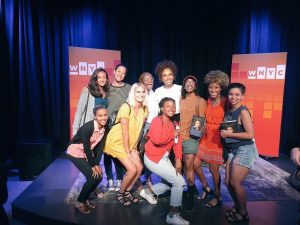Name: Nyasa Hendrix
Class Year: 2018
Major: History of Art
Hometown: New York, New York
Internship Placement: Sadie Nash Leadership Program
Job Title: Dean
Location: NYC

Nashers at the Studio Museum in Harlem, N.Y.
What’s happening at your internship?
Workshops, introductions and tons of icebreakers. Currently, while working for Sadie Nash Leadership Program, I am working very closely with Y.W.O.C ( young womyn of color) from the ages 14-18 helping them discover their leadership, their relationship to Power, Identity and Privilege, and hosting a different leader within the social justice community on Wednesdays during community breakfast.

Nashers at the “We Wanted A Revolution” Show at the Brooklyn Museum, N.Y.
Sadie Nash is a unique space that welcomes the nuance of blackness and P.O.C-ness as an active space that tries to reject the traditional school system as well as all -isms our Nashers ( participants) might be facing. Our program has just recently started, we are two weeks in and are having hands-on connection with the Nashers. Prior to this, we deans spent four weeks training. We learned complex facilitation skills, worked closely with a social worker to be able to read signs of self-harm and neglect, all the while learning how to create complex workshops and lesson plans to teach Nashers about our own personal interests and issues that relate to the core values of Sadie Nash as an organization. Going into week three, we are looking for another exciting week, leading to a weekend of bonding away at a camp in New Jersey as an opportunity to see the budding relationships of trust and validation bloom.

Nasher + Dean Mailboxes for warm and fuzzies, theme “Slide Into the Siblinghood.”
Why did you apply for this internship?
I applied for Sadie Nash because it is a space I am always wanting to be a part of, one that is constantly recognizing womyn of color in all of our nuances, phases and feelings. I particularly was drawn to the notion that Sadie Nash is completely run by W.O.C and has a true dedication to constantly grounding themselves in womanism. I applied to Sadie Nash to be a part of something bigger than me, to be challenged with responsibility ( as a dean we have quite a lot. Deans are often referred to as the glue of the program) and to reconnect with an age group I often feel detached from. Sadie Nash has not disappointed; everyday I am amazed by the things the Nashers say, the respect I am am given as well as the sheer support that is offered. The honesty and support of the space has allowed me to be vulnerable in ways I didn’t know I needed to be and yet and still, I am held, properly. It is absolutely amazing to be a part of this, and even in my short time I have so many things to bring back to my Bryn Mawr community and my community beyond.
Can you talk about the skills you are learning and why they are important to you?
Sadie Nash has taught me so many things. It has taught me about myself, about my relationships and about things I need to let go of. But, one skill I have learned that I will cherish forever will be the skill to hold and cultivate space. I think this is a skill that is overlooked; to be able to make people feel like the belong, like they are valid and meaningful is a harder feat than some lead on. My experience as a Q.W.O.C (queer womyn of color) is one that is often pushed aside, disregarded and sometimes completely ignored. To be able to feel valid in a space truly means the world to me. I am happy that I have been a part of a space so spiritually and intellectually aware, that this comes as second nature. It is almost implied that when we uplift the womyn in our space, we are uplifting them for life. This is not to say that I did not have the skill already, but rather it has been developed, honed in on and expanded. I am most definitely grateful and forever indebted to the Sadie Nash space for this.

What has been the biggest challenge you have faced at your internship?
The biggest challenge I have faced at my internship would be a very interesting space politic. Sadie Nash as an organization really provides a particular realm of services, often a list of services those outside of the space do not understand. By this I mean, we are currently renting space and just two weeks in, we have been moved and shuffled around about three to four times. It has been on the grounds of W.O.C being “too loud,” “inconsiderate” and lots of other loaded words, terms that have historical lineages to being disrespectful and dehumanizing to W.O.C. But nevertheless, we have pushed on. It has been very hard on us as a team, to continue to cultivate the space we want with intention when others are invested to stopping that very thing. We have to do a lot of explaining to the Nashers as well as a lot of compromise that’s simply unjust and unfair. It is even harder because space, as in physical spaces, really affects how people engage, if they are even willing to do so, so it has been hard to continue to follow-though when it is being made so difficult for us to do so. But, this is where the skill of holding space comes in, because no matter what room we are in, so matter how many times we are told to be quiet, we hold our Nashers, in all of the nuance, in all of themselves and we push forward. If that isn’t Sadie Nash, then I don’t know what is.

Nashers at the Shomburg Center for Research, Harlem, N.Y.
